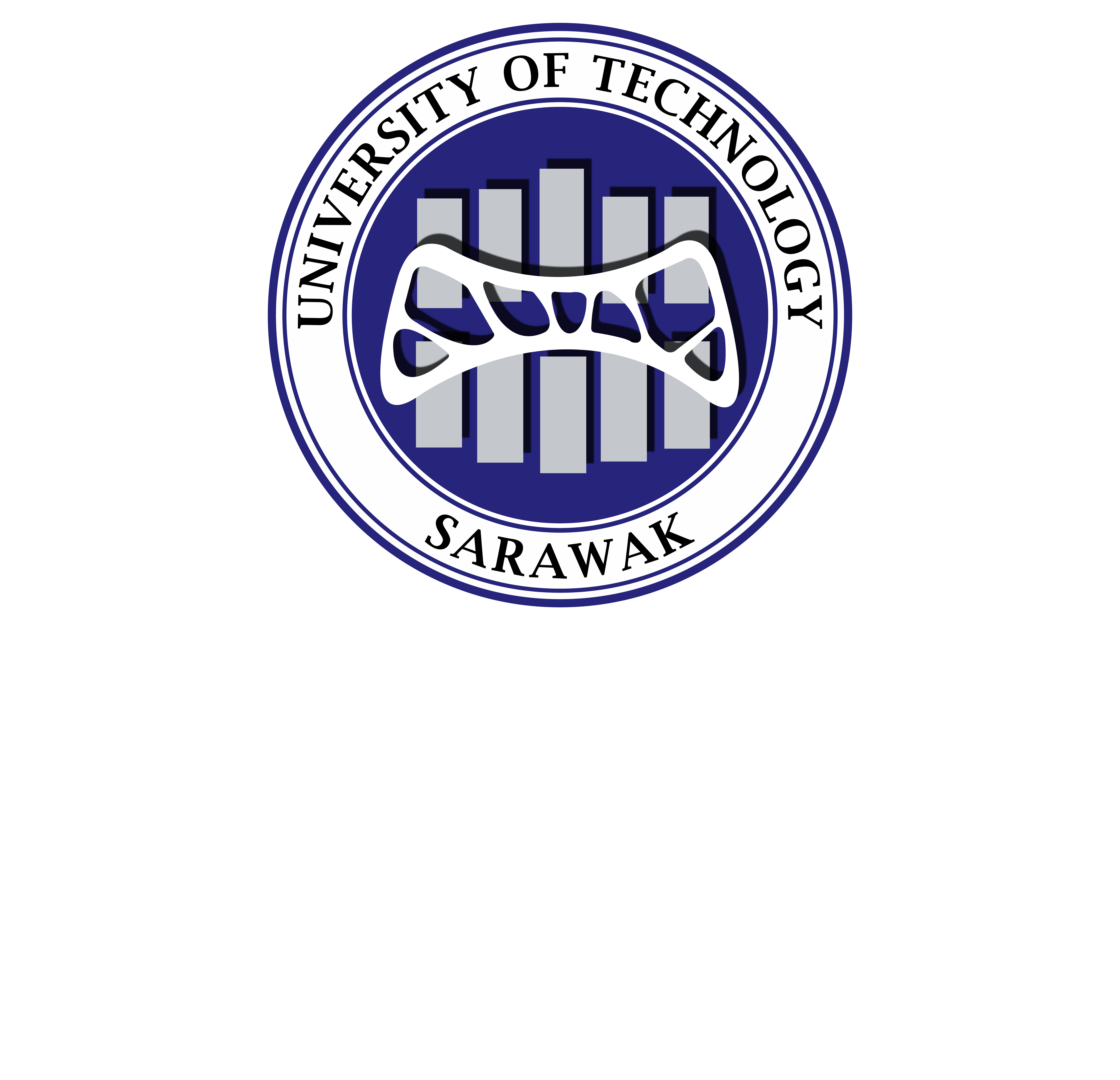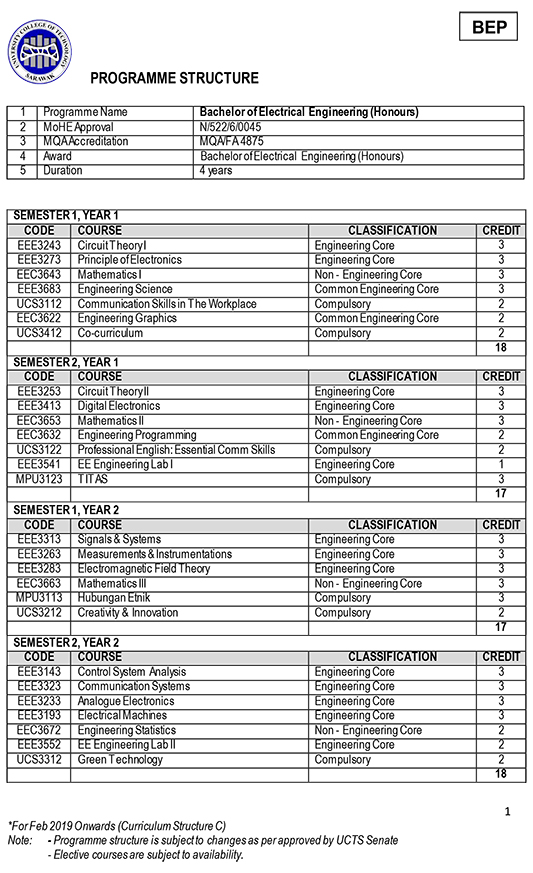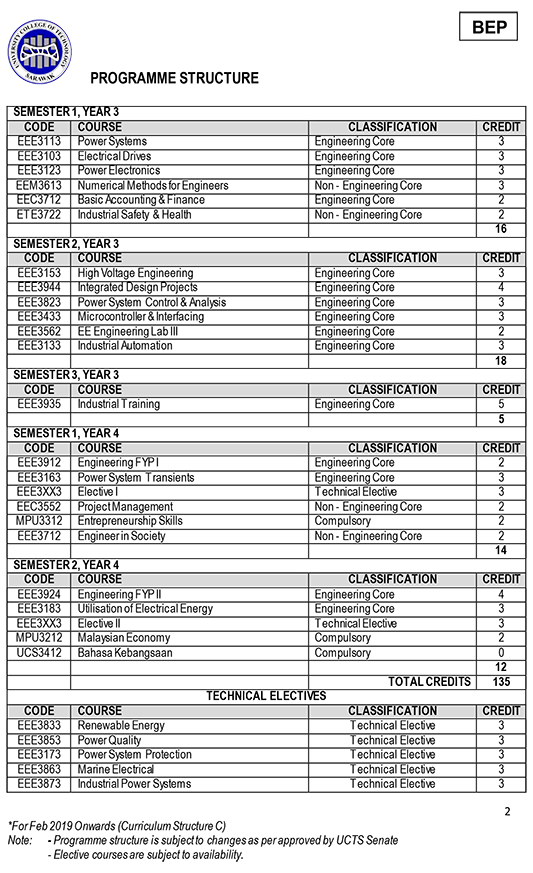Programme Overview
Industries that need electrical engineers span various engineering fields including the electrical power and supply industries, renewable energy industries, oil and gas industries, manufacturing industries, maintenance industries and marine engineering works industries. Hence, UCTS Bachelor of Electrical Engineering (Honours) programme is specifically designed and offered to meet the huge demand of innovative and technically competent electrical engineers by Sarawak Corridor of Renewal Energy (SCORE) and rapid growth of industrial development in Malaysia.
This programme aims to equip students with various fundamental knowledge and skills in both electrical and electronics engineering and prepare the students to be specialised in electrical power engineering for their career development within this discipline. Technical elective subjects are offered in the 3rd and final years to provide various specialisation in electrical engineering.
Programme Aims
To produce Electrical engineers capable of fulfilling their professional demands in highly competitive global markets with confidence, outstanding ethical and moral values.
Programme Educational Objectives (PEOs)
- Graduates with good level of knowledge and competency skills, graduates will be employed or self-employed in electrical and relevant engineering field. Appropriate attitude will enabling them to have successful career.
- Graduates will acquire abilities for effective communication, collaborative working in diverse teams, and continual development through professional involvement.
- Graduates will pursue lifelong learning, stay informed of current electrical and relevant engineering practices and contemporary issues, and actively involved in research.
Programme Learning Outcomes (PLOs)
- Apply knowledge of mathematics, natural science, electrical engineering fundamentals and an engineering specialisation to the solution of complex engineering problems.
- Identify, formulate, conduct research literature and analyse complex electrical engineering problems reaching substantiated conclusions creatively and innovatively.
- Design solutions or processes for complex electrical engineering problems using integrated approaches.
- Create, select and apply appropriate techniques, resources, and modern tools, including prediction and modelling, to complex electrical engineering problems, with an understanding of the limitations.
- Apply reasoning informed by contextual knowledge to assess societal, health, safety and cultural issues and the consequent responsibilities relevant to professional engineering practice and solutions to complex engineering problems.
- Apply ethical principles and commit to professional ethics and responsibilities and norms of engineering practice.
- Communicate effectively in writing and verbally on complex engineering activities with the engineering community and with society at large.
- Function effectively as an individual, and as a member or leader in diverse teams.
- Demonstrate knowledge and understanding of engineering management principles and economic decision making to manage projects in diverse environments.
- Conduct investigation of complex electrical engineering problems using research-based knowledge and research methods including design of experiments, analysis and interpretation of data, and synthesis of information to provide valid conclusions.
- Recognise the need for, and have the preparation and ability to engage in independent and life-long learning in the broadest context of technological change.
- Understand and evaluate the sustainability and impact of professional engineering work in the solutions of complex engineering problems in societal and environmental contexts.
Duration of Study
4 Years
Demand of Electrical Engineers
- The electrical energy industry is huge in Malaysia where the development of new power sources such as hydroelectric dams to power the country’s rapid industrialization. The employment can be found easily with electricity supply authorities, machine manufacturers and other large-scale users of electrical energy.
- Sarawak Corridor of Renewable Energy (SCORE) attracts multinationals which require huge number of engineering personnel (engineers, technologists and technicians) for the industrial plants
- High demand arising from organic growth coupled with higher consumption especially from energy intensive multinationals at SCORE region will fuel the need for additional capacity for electrical power.
- Sarawak is currently in the process of creating more sustainable supply of energy through the renewable energy sources such as from hydro, solar and waste energy.
- It implies the electrical engineers are in high demand for power generation plant, hydroelectric dam and even the transmission line and substations. It is reported that up to 7,400MW will be generated by 2025 for the state demand and also the exportation of the surplus capacity to the surrounding region such as Peninsular Malaysia and neighbouring countries such as West Kalimantan, Brunei, Indonesia, and Philippines.
- In addition to a relatively stable job market and financial reward, electrical engineers have the gratification that comes from working to meet the needs of society. There is no limit to the personal satisfaction gained from helping make our world a better place to live.
Career In Electrical Engineering
Electrical engineers use science, technology and problem-solving skills to design, develop and supervise the manufacturing, installation, operation and maintenance of equipment machines and systems for the generation, distribution, utilisation and control of electrical power. They may work in design, research and development, production or management positions at government agencies or private corporations. In the context of Sarawak, catalysed by Sarawak Corridor of Renewable Energy (SCORE) the demand for electrical engineers is in high demand.
Accreditation
Bachelor of Electrical Engineering (Honours) has fulfilled the provisional requirements by Malaysian Quality Agency (MQA) and Engineering Accreditation Council (EAC); and allowing graduates to be recognised as practising engineers under the Board of Engineers Malaysia (BEM).
Entry Requirements
- Pass STPM/A-level with full pass in Mathematics and Physical Science; or
- Pass UEC with five (5) Grade B’s including Mathematics and Physical Science; or
- Pass Matriculation / Pre-U/ Foundation in Science from recognised institutions with minimum CGPA 2.0; or
- Pass Diploma in related field from recognised institutions with minimum CGPA 2.0; or
- Other equivalent qualifications recognised by the Malaysian Government
Tuition Fees
Study loans are available from PTPTN. The tuition fees above are only applicable to local / Malaysian students. For more details and information, please contact our Marketing Office at (+6) 084-367300 or email to enquiry@uts.edu.my.
Programme Structure and Synopsis
Click Here to download synopsis







